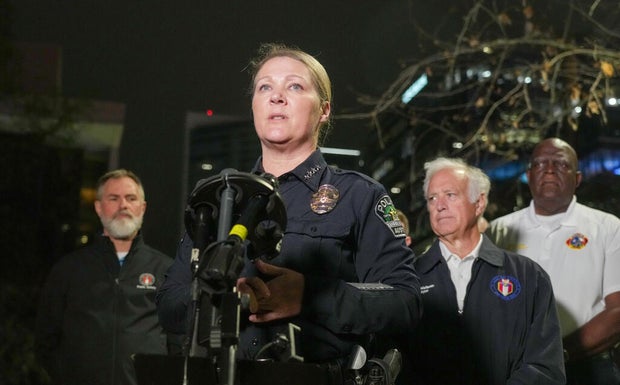News
Marathon Oil reaches a $241 million settlement with EPA for environmental violations

Pump jacks extract oil from beneath the ground in North Dakota on May 19, 2021. The federal government announced a $241.5 million settlement with Marathon Oil on Thursday for alleged air quality violations at the company’s oil and gas operations in the Forth Berthold Indian Reservation in North Dakota.
Matt Brown/AP
hide caption
toggle caption
Matt Brown/AP
The federal government announced a $241.5 million settlement with Marathon Oil on Thursday for alleged air quality violations at the company’s oil and gas operations on the Fort Berthold Indian Reservation in North Dakota.
The Environmental Protection Agency and Department of Justice said the settlement requires Marathon to reduce climate- and health-harming emissions from those facilities and will result in over 2.3 millions tons worth of pollution reduction.
“This historic settlement — the largest ever civil penalty for violations of the Clean Air Act at stationary sources — will ensure cleaner air for the Fort Berthold Indian Reservation and other communities in North Dakota, while holding Marathon accountable for its illegal pollution,” said Attorney General Merrick Garland.
Marathon officials did not immediately respond to a request for comment. Houston-based Marathon operates 169 well pads in North Dakota, where the company extracts oil and natural gas. A proposed consent decree for implementing the settlement says the company does not admit any liability over the allegations, but that the two sides agree it will avoid litigation and serve the public interest.
A spokesperson for the Mandan, Hidatsa and Arikara Nation based at the Fort Berthold Reservation did not immediately respond to a request for comment either.

While Marathon is the country’s 22nd-largest oil producer based on 2022 data, the federal agencies said, it’s also the seventh-largest emitter of greenhouse gas emissions in the oil and gas industry. Much of its emissions come from flaring, the industry practice of burning waste gases, including methane, which the EPA says is 25 times more potent of a contributor to climate change than carbon dioxide. While flaring burns off methane and other pollutants, it’s not completely efficient, so significant quantities still get released into the atmosphere, which the agencies said can have health impacts on nearby communities.
The settlement is part of an EPA climate change enforcement initiative that focuses in part on reducing methane emissions from oil and gas production and from landfills.
It calls for Marathon to eliminate the equivalent of over 2.25 million tons of carbon-dioxide emissions over the next five years, which the agencies said was tantamount to taking 487,000 cars off the road for one year, and will also eliminate nearly 110,000 tons of volatile organic compound emissions, which contribute to asthma and other respiratory diseases.
“This settlement is a major win for the health and future of our Tribal communities, including people and families who are often overburdened by pollution,” said KC Becker, the EPA’s regional administrator. “As a result of the agreement, Marathon has and will continue to take comprehensive measures to come into compliance and reduce harmful emissions across hundreds of production sources. These investments will improve air quality and reduce respiratory illnesses across the Fort Berthold Indian Reservation and western North Dakota.”
The agencies said the case is the first of its kind against an oil and gas producer for “violations of major source emissions permitting requirements under the Clean Air Act’s Prevention of Significant Deterioration program.” They also said the $64.5 million civil penalty Marathon must pay is the largest-ever penalty imposed for “stationary source violations,” which include facilities such as oil and gas tank systems.
The Justice Department said it’s the largest of 12 similar efforts by the Biden administration to target emissions from the oil and gas industry, with a penalty that’s more than double the 11 previous settlements combined.
Marathon also agreed to invest $177 million in extensive compliance measures, much of of it by the end of the year, that the agencies said will “significantly reduce” harmful emissions from 169 existing facilities on state land and on the reservation, as well as at new facilities built in North Dakota.
The settlement is part of a complaint and proposed consent decree officially filed Thursday in federal court in North Dakota. The complaint alleges that Clean Air Act violations at nearly 90 Marathon facilities resulted in thousands of tons of illegal pollution. And it alleges that Marathon submitted artificially low estimates of its emissions to avoid permitting requirements.
The consent decree is subject to a 30-day public comment period.

In May, ConocoPhillips said it was buying Marathon Oil in an all-stock deal valued at about $17.1 billion. The deal, worth $22.5 billion when including $5.4 billion in debt, comes as energy prices have surged and big oil companies have reaped huge profits. The acquisition was expected to close by the end of the year.
In its latest financial report, Marathon said it earned $297 million in the three-month period that ended March 31, posting revenue of $1.55 billion.
Thursday’s settlement did not appear to rattle investors. Marathon’s stock closed up 1.6% Thursday. It has risen about 18% so far this year.

News
Satellite images provide view inside Iran at war

Smoke rises over Konarak naval base in southern Iran on Sunday. The base was one of hundreds of targets of U.S. and Israeli forces throughout the country.
Planet Labs PBC
hide caption
toggle caption
Planet Labs PBC
Commercial satellite images are providing a unique look at the extent of damage being done to Iran’s military facilities across the country.
The U.S. and Israeli military campaign opened with a daytime attack that struck Iranian leadership in central Tehran. Smoke was still visible rising from Ayatollah Ali Khamenei’s compound following the attack that killed the supreme leader.

An image by the company Airbus taken on Saturday shows the aftermath of an Israeli strike on Iran’s Leadership House in central Tehran. Iran’s Supreme Leader Ayatollah Ali Khamenei was killed in the opening wave of attacks.
Pléiades Neo (c) Airbus DS 2026
hide caption
toggle caption
Pléiades Neo (c) Airbus DS 2026
Israel and the U.S. have gone on to strike targets across the country. Reports on social media indicate that there have been numerous military bases and compounds attacked all over Iran, and Iran has responded with attacks throughout the Middle East.
U.S. forces have also been striking at Iran’s navy. In a post on his social media platform, President Trump said that he had been briefed that U.S. forces had sunk nine Iranian naval vessels. U.S. Central Command did not immediately confirm that number but it did say it had struck an Iranian warship in port.

An image captured on Saturday shows a ship burning at Iran’s naval base at Konarak.
Satellite image ©2026 Vantor
hide caption
toggle caption
Satellite image ©2026 Vantor
Numerous satellite images show burning vessels at Konarak naval base in southern Iran. Images also show damage to a nearby airbase where hardened hangers were struck by precision munitions.

Hardened aircraft shelters at Konarak airbase were struck with precision munitions.
Satellite image ©2026 Vantor
hide caption
toggle caption
Satellite image ©2026 Vantor
And there was extensive damage at a drone base in the same area. Iran has launched numerous drones and missiles toward Israel and U.S. military installations in Bahrain, Kuwait and Qatar. Many drones have been intercepted but videos on social media show that some have evaded air defenses and caused damage in nearby Gulf countries. In Dubai, debris from an Iranian drone damaged the iconic Burj Al Arab, according to a statement from Dubai’s government.

Buildings at an Iranian drone base at Konarak were destroyed in the strikes.
Satellite image ©2026 Vantor
hide caption
toggle caption
Satellite image ©2026 Vantor
Iran’s most powerful weapons are its long-range missiles. The Iranian Revolutionary Guards have hidden the missiles deep inside mountain tunnels. Images taken Sunday in the mountains of northern Iran indicate that some of those tunnels were hit in a wave of strikes.
Following Khamenei’s death, Iran declared 40 days of mourning. Satellite images showed mourners gathering in Tehran’s Enghelab square on Sunday.
Iranian Foreign Ministry Spokesperson Esmail Baghaei told NPR on Sunday that Iran will continue to fight “foreign aggression, foreign domination.”
A White House official told NPR that Trump plans to talk to Iran’s interim leadership “eventually,” but that for now, U.S. operations continue in the region “unabated.”

A large crowd of mourners fill Enghelab Square in Tehran on Sunday, following the death of Iran’s Supreme Leader Ayatollah Ali Khamenei, who was killed in an Israeli airstrike.
Satellite image ©2026 Vantor
hide caption
toggle caption
Satellite image ©2026 Vantor
News
Video: What the Texas Primary Battle Means for the Midterms

new video loaded: What the Texas Primary Battle Means for the Midterms
By J. David Goodman, Alexandra Ostasiewicz, June Kim and Luke Piotrowski
March 1, 2026
News
Mass shooting at Austin, Texas bar leaves at least 3 dead, 14 wounded, authorities say

Gunfire rang out at a bar in Austin, Texas, early Sunday and at least three people were killed, the city’s police chief said.
Austin Police Chief Lisa Davis told reporters the shooter was killed by officers at the scene.
Fourteen others were hospitalized and three were in critical condition, Austin-Travis County EMS Chief Robert Luckritz said.
“We received a call at 1:39 a.m. and within 57 seconds, the first paramedics and officers were on scene actively treating the patients,” Luckritz said.
There was no initial word on the shooter’s identity or motive.
Davis noted how fortunate it was that there was a heavy police presence in Austin’s entertainment district at the time, enabling officers to respond quickly as bars were closing.
“Officers immediately transitioned … and were faced with the individual with a gun,” Davis said. “Three of our officers returned fire, killing the suspect.”
She called the shooting a “tragic, tragic” incident.
Austin Mayor Kirk Watson said his heart goes out to the victims, and he praised the swift response of first responders.
“They definitely saved lives,” he said.
Davis said federal law enforcement is aiding the investigation.
-

 World4 days ago
World4 days agoExclusive: DeepSeek withholds latest AI model from US chipmakers including Nvidia, sources say
-

 Massachusetts4 days ago
Massachusetts4 days agoMother and daughter injured in Taunton house explosion
-

 Montana1 week ago
Montana1 week ago2026 MHSA Montana Wrestling State Championship Brackets And Results – FloWrestling
-

 Denver, CO4 days ago
Denver, CO4 days ago10 acres charred, 5 injured in Thornton grass fire, evacuation orders lifted
-

 Louisiana7 days ago
Louisiana7 days agoWildfire near Gum Swamp Road in Livingston Parish now under control; more than 200 acres burned
-

 Technology1 week ago
Technology1 week agoYouTube TV billing scam emails are hitting inboxes
-

 Technology1 week ago
Technology1 week agoStellantis is in a crisis of its own making
-

 Politics1 week ago
Politics1 week agoOpenAI didn’t contact police despite employees flagging mass shooter’s concerning chatbot interactions: REPORT


















